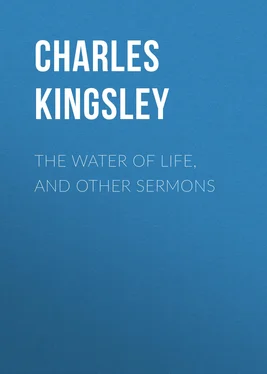Charles Kingsley - The Water of Life, and Other Sermons
Здесь есть возможность читать онлайн «Charles Kingsley - The Water of Life, and Other Sermons» — ознакомительный отрывок электронной книги совершенно бесплатно, а после прочтения отрывка купить полную версию. В некоторых случаях можно слушать аудио, скачать через торрент в формате fb2 и присутствует краткое содержание. Жанр: foreign_prose, foreign_religion, Философия, foreign_psychology, foreign_antique, на английском языке. Описание произведения, (предисловие) а так же отзывы посетителей доступны на портале библиотеки ЛибКат.
- Название:The Water of Life, and Other Sermons
- Автор:
- Жанр:
- Год:неизвестен
- ISBN:нет данных
- Рейтинг книги:4 / 5. Голосов: 1
-
Избранное:Добавить в избранное
- Отзывы:
-
Ваша оценка:
- 80
- 1
- 2
- 3
- 4
- 5
The Water of Life, and Other Sermons: краткое содержание, описание и аннотация
Предлагаем к чтению аннотацию, описание, краткое содержание или предисловие (зависит от того, что написал сам автор книги «The Water of Life, and Other Sermons»). Если вы не нашли необходимую информацию о книге — напишите в комментариях, мы постараемся отыскать её.
The Water of Life, and Other Sermons — читать онлайн ознакомительный отрывок
Ниже представлен текст книги, разбитый по страницам. Система сохранения места последней прочитанной страницы, позволяет с удобством читать онлайн бесплатно книгу «The Water of Life, and Other Sermons», без необходимости каждый раз заново искать на чём Вы остановились. Поставьте закладку, и сможете в любой момент перейти на страницу, на которой закончили чтение.
Интервал:
Закладка:
All his old Jewish notions of the resurrection, though they were true as far as they went, seemed poor and paltry beside what Christ had taught him. He was not going to wait till the end of the world—perhaps for thousands of years—in darkness and the shadow of death, he knew not where or how. His soul was to pass at once into life,—into joy, and peace, and bliss, in the presence of his Saviour, till it should have a new body given to it, in the resurrection of life at the last day.
This, I think, is what St. Paul learned, and what the Jews had not learned till our blessed Lord came. They were still afraid of death. It looked to them a dark and ugly blank; and no wonder. For would it not be dark and ugly enough to have to wait, we know not where, it may be a thousand, it may be tens of thousands of years, till the resurrection in the last day, before we entered into joy, peace, activity or anything worthy of the name of life? Would not death have a sting indeed, the grave a victory indeed, if we had to be as good as dead for ten thousands of years?
What then? Remember this, that death is an enemy, an evil thing, an enemy to man, and therefore an enemy to Christ, the King and Head and Saviour of man. Men ought not to die, and they feel it. It is no use to tell them, ‘Everything that is born must die, and why not you? All other animals died. They died, just as they die now, hundreds of thousands of years before man came upon this earth; and why should man expect to have a different lot? Why should you not take your death patiently, as you take any other evil which you cannot escape?’ The heart of man, as soon as he begins to be a man, and not a mere savage; as soon as he begins to think reasonably, and feel deeply; the heart of man answers: ‘No, I am not a mere animal. I have something in me which ought not to die, which perhaps cannot die. I have a living soul in me, which ought to be able to keep my body alive likewise, but cannot; and therefore death is my enemy. I hate him, and I believe that I was meant to hate him. Something must be wrong with me, or I should not die; something must be wrong with all mankind, or I should not see those I love dying round me.
Yes, my friends, death is an enemy,—a hideous, hateful thing. The longer one looks at it, the more one hates it. The more often one sees it, the less one grows accustomed to it. Its very commonness makes it all the more shocking. We may not be so much shocked at seeing the old die. We say, ‘They have done their work, why should they not go?’ That is not true. They have not done their work. There is more work in plenty for them to do, if they could but live; and it seems shocking and sad, at least to him who loves his country and his kind, that, just as men have grown old enough to be of use, when they have learnt to conquer their passions, when their characters are formed, when they have gained sound experience of this world, and what man ought and can do in it,—just as, in fact, they have become most able to teach and help their fellow-men,—that then they are to grow old, and decrepit, and helpless, and fade away, and die just when they are most fit to live, and the world needs them most.
Sad, I say, and strange is that. But sadder, and more strange, and more utterly shocking, to see the young die; to see parents leaving infant children, children vanishing early out of the world where they might have done good work for God and man.
What arguments will make us believe that that ought to be? That that is God’s will? That that is anything but an evil, an anomaly, a disease?
Not the Bible, certainly. The Bible never tells us that such tragedies as are too often seen are the will of God. The Bible says that it is not the will of our Father that one of these little ones should perish. The Bible tells us that Jesus, when on earth, went about fighting and conquering disease and death, even raising from the dead those who had died before their time. To fight against death, and to give life wheresoever He went—that was His work; by that He proclaimed the will of God, His Father, that none should perish, who sent His Son that men might have life, and have it more abundantly. By that He declared that death was an evil and a disorder among men, which He would some day crush and destroy utterly, that mortality should be swallowed up of life.
And yet we die, and shall die. Yes. The body is dead, because of sin. Mankind is a diseased race; and it must pay the penalty of its sins for many an age to come, and die, and suffer, and sorrow. But not for ever. For what mean such words as these—for something they must mean?—
‘If a man keep my saying, he shall never see death.’ And again, ‘He that believeth in Me, though he were dead, yet shall he live; and he that liveth and believeth in Me shall never die.’
Do such words as these mean only that we shall rise again in the resurrection at the last day? Surely not. Our Lord spoke them in answer to that very notion.
‘Martha said to Him, I know that my brother shall rise again, in the resurrection at the last day. Jesus said unto her, I am the resurrection and the life;’ and then showed what He meant by bringing back Lazarus to life, unchanged, and as he had been before he died.
Surely, if that miracle meant anything, if these words meant anything, it meant this: that those who die in the fear of God, and in the faith of Christ, do not really taste death; that to them there is no death, but only a change of place, a change of state; that they pass at once, and instantly, into some new life, with all their powers, all their feelings, unchanged,—purified doubtless from earthly stains, but still the same living, thinking, active beings which they were here on earth. I say, active. The Bible says nothing about their sleeping till the Day of Judgment, as some have fancied. Rest they may; rest they will, if they need rest. But what is the true rest? Not idleness, but peace of mind. To rest from sin, from sorrow, from fear, from doubt, from care,—this is the true rest. Above all, to rest from the worst weariness of all—knowing one’s duty, and yet not being able to do it. That is true rest; the rest of God, who works for ever, and yet is at rest for ever; as the stars over our heads move for ever, thousands of miles each day, and yet are at perfect rest, because they move orderly, harmoniously, fulfilling the law which God has given them. Perfect rest, in perfect work; that surely is the rest of blessed spirits, till the final consummation of all things, when Christ shall have made up the number of His elect.
I hope that this is so. I trust that this is so. I think our Lord’s great words can mean nothing less than this. And if it be so, what comfort for us who must die? What comfort for us who have seen others die, if death be but a new birth into some higher life; if all that it changes in us is our body—the mere shell and husk of us—such a change as comes over the snake, when he casts his old skin, and comes out fresh and gay, or even the crawling caterpillar, which breaks its prison, and spreads its wings to the sun as a fair butterfly. Where is the sting of death, then, if death can sting, and poison, and corrupt nothing of us for which our friends have loved us; nothing of us with which we could do service to men or God? Where is the victory of the grave, if, so far from the grave holding us down, it frees us from the very thing which holds us down,—the mortal body?
Death is not death, then, if it kills no part of us, save that which hindered us from perfect life. Death is not death, if it raises us in a moment from darkness into light, from weakness into strength, from sinfulness into holiness. Death is not death, if it brings us nearer to Christ, who is the fount of life. Death is not death, if it perfects our faith by sight, and lets us behold Him in whom we have believed. Death is not death, if it gives us to those whom we have loved and lost, for whom we have lived, for whom we long to live again. Death is not death, if it joins the child to the mother who is gone before. Death is not death, if it takes away from that mother for ever all a mother’s anxieties, a mother’s fears, and lets her see, in the gracious countenance of her Saviour, a sure and certain pledge that those whom she has left behind are safe, safe with Christ and in Christ, through all the chances and dangers of his mortal life. Death is not death, if it rids us of doubt and fear, of chance and change, of space and time, and all which space and time bring forth, and then destroy. Death is not death; for Christ has conquered death, for Himself, and for those who trust in Him. And to those who say, ‘You were born in time, and in time you must die, as all other creatures do; Time is your king and lord, as he has been of all the old worlds before this, and of all the races of beasts, whose bones and shells lie fossil in the rocks of a thousand generations;’ then we can answer them, in the words of the wise man, and in the name of Christ who conquered death:—
Читать дальшеИнтервал:
Закладка:
Похожие книги на «The Water of Life, and Other Sermons»
Представляем Вашему вниманию похожие книги на «The Water of Life, and Other Sermons» списком для выбора. Мы отобрали схожую по названию и смыслу литературу в надежде предоставить читателям больше вариантов отыскать новые, интересные, ещё непрочитанные произведения.
Обсуждение, отзывы о книге «The Water of Life, and Other Sermons» и просто собственные мнения читателей. Оставьте ваши комментарии, напишите, что Вы думаете о произведении, его смысле или главных героях. Укажите что конкретно понравилось, а что нет, и почему Вы так считаете.












